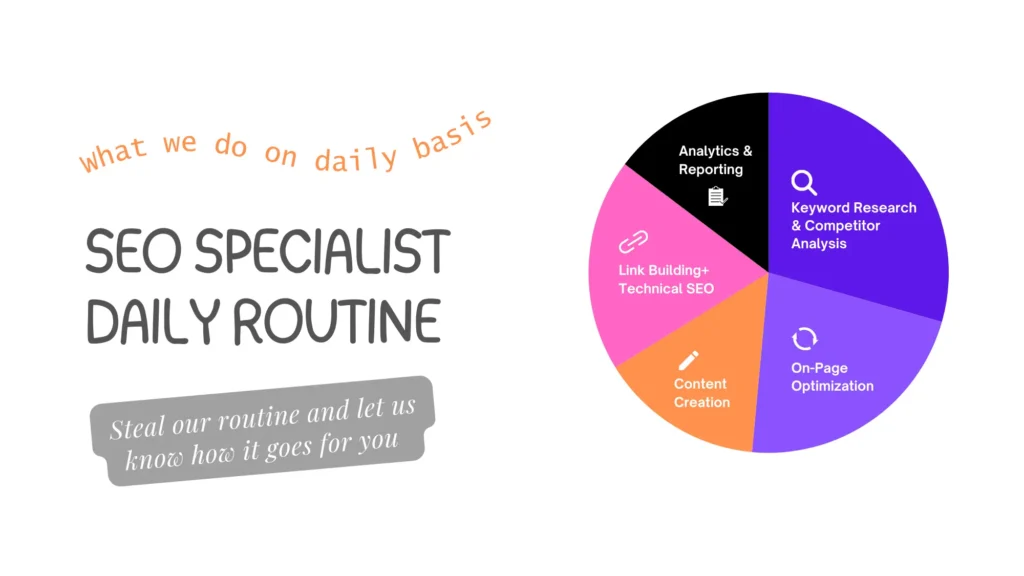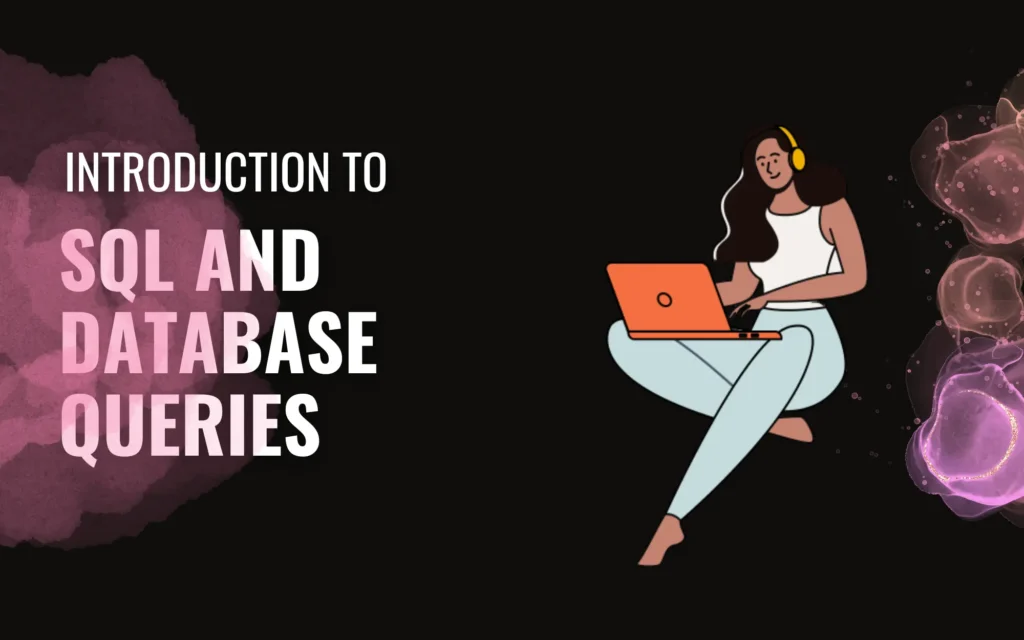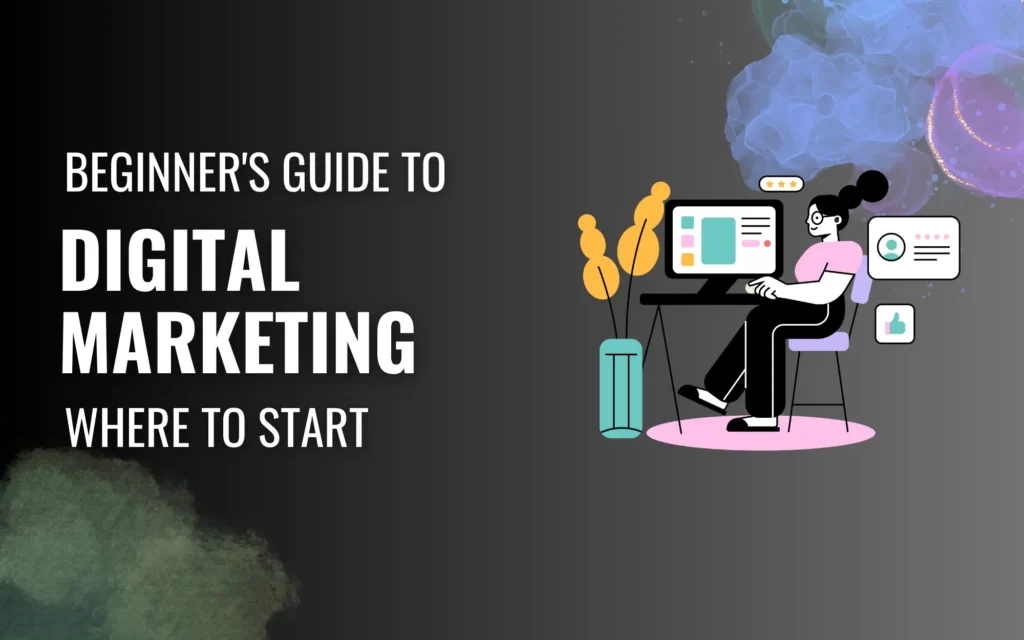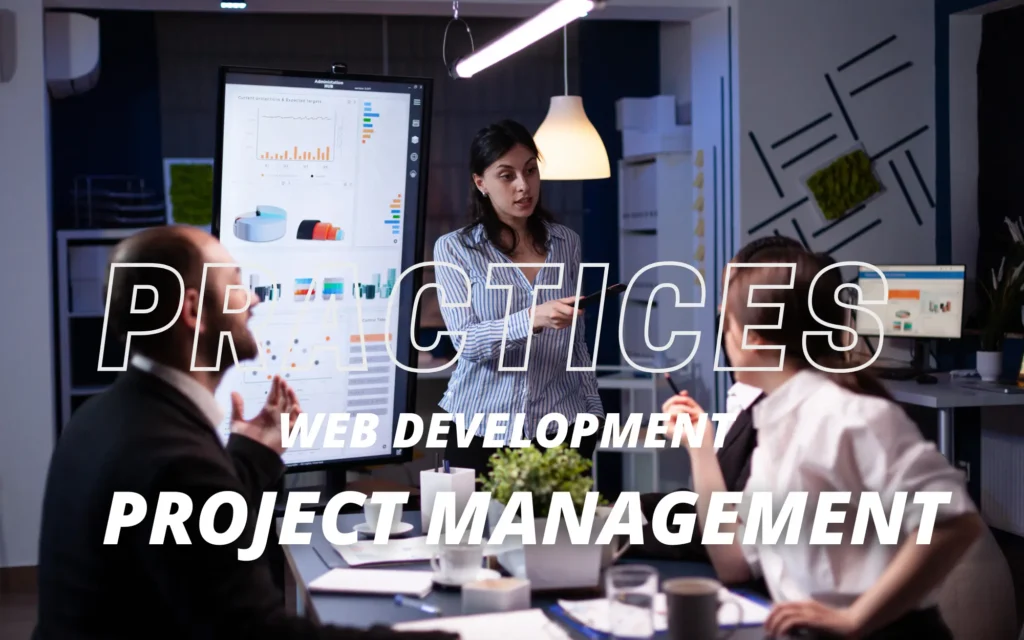Imagine a day in the life of an SEO specialist. Far from a leisurely routine, it is a dynamic blend of strategy, creativity, and technical expertise. This article delves into the multifaceted role of an SEO specialist, why they are crucial in the digital marketing landscape, and a detailed look at their daily routine.

What Does an SEO Specialist Do?
Keyword Research
An SEO specialist starts their day with keyword research, identifying pertinent keywords to target for content and optimization. This involves using tools like SEMrush, Ahrefs, and AnswerThePublic to uncover keywords that align with the business’s goals and audience interests. Advanced techniques include LSI (Latent Semantic Indexing) keywords, which are terms semantically related to your primary keywords. Utilizing tools like AnswerThePublic can help uncover these terms, providing a broader scope of keywords that can capture various user intents.
On-Page Optimization
This entails refining web pages, including meta tags, headings, and content, to enhance their compatibility with search engine algorithms. An SEO specialist ensures that every page is optimized for relevant keywords, improving visibility in search results. Tailoring content to meet user intent ensures higher engagement and conversion rates.
Content Creation
Crafting high-quality, SEO-optimized content is a core responsibility. Specialists collaborate with content creators to produce articles, blog posts, and other content types that engage audiences and improve search rankings. Content clusters around primary keywords and linking them to pillar content can help address multiple user intents, improving both SEO and user experience.
Finding hard to do content creation on your own, let us help you out contcat us today
Link Building
Securing high-quality backlinks from reputable sites is essential for boosting a website’s authority. SEO specialists employ various strategies to acquire these links, enhancing the site’s credibility and search engine ranking. Guest posting on authoritative sites and broken link building are effective strategies for link acquisition.
Technical SEO
This involves improving site performance through actions like enhancing site speed, ensuring mobile-friendliness, and implementing schema markup. Technical SEO ensures that search engines can crawl and index the site effectively. Implementing structured data (schema markup) helps search engines understand your content better, potentially leading to rich snippets in search results.
Competitor Analysis
An SEO specialist continually evaluates competitors’ strategies to identify opportunities for improvement. This analysis helps in understanding market trends and devising effective SEO tactics. Analyzing competitors’ SEO strategies, content, and backlink profiles helps identify strengths and weaknesses.
Analytics and Reporting
Tracking website performance, traffic, and SEO metrics is crucial. Specialists use tools like Google Analytics and Google Search Console to monitor progress and make data-driven decisions. Setting up custom dashboards in Google Analytics can help track specific goals and KPIs.
Algorithm Updates
Staying updated with search engine algorithm changes is vital. SEO specialists adjust their strategies based on these updates to maintain or improve search rankings. Following industry leaders on social media, subscribing to SEO newsletters, and participating in webinars are excellent ways to stay updated. Read the latest Algorithm Updates from google
SEO Audits
Conducting comprehensive audits helps identify and rectify issues affecting website ranking and performance. This includes checking for duplicate content, broken links, and other technical issues. Technical SEO goes beyond basic audits, ensuring that site-wide HTTPS usage improves security and rankings.
Local SEO
Enhancing local search visibility is important for businesses targeting local customers. SEO specialists optimize the site for local search terms and manage online reviews and listings.
Here are a few tips for you to deep dive into essential SEO activities
Advanced Keyword Research Techniques
Keyword research is more than just identifying high-traffic terms. Advanced techniques include LSI (Latent Semantic Indexing) keywords, which are terms semantically related to your primary keywords. Utilizing tools like AnswerThePublic can help uncover these terms, providing a broader scope of keywords that can capture various user intents. Analyzing competitor keywords using tools like SEMrush or Ahrefs can also reveal valuable opportunities that you might have overlooked.
Optimizing for User Intent
Understanding user intent is crucial for successful SEO. User intent can be categorized into informational, navigational, transactional, and commercial investigation. Tailoring your content to meet these intents ensures higher engagement and conversion rates. Creating content clusters around primary keywords and linking them to pillar content can help address multiple user intents, improving both SEO and user experience.
Technical SEO Best Practices
Technical SEO goes beyond basic audits. Implementing structured data (schema markup) helps search engines understand your content better, potentially leading to rich snippets in search results. Ensuring HTTPS is used site-wide improves security and can positively affect rankings. Regularly updating your XML sitemap and robots.txt file ensures that search engines can efficiently crawl and index your site.
Effective Link Building Strategies
Building a diverse and high-quality backlink profile is essential. Guest posting on authoritative sites in your niche not only earns you valuable backlinks but also positions you as an industry expert. Broken link building involves finding broken links on other websites and suggesting your content as a replacement. Additionally, creating shareable infographics and other visually engaging content can attract natural backlinks from various online sources.
Content Optimization for Maximum Impact
Content optimization should focus on both new and existing content. For existing content, performing a content audit helps identify which pieces need updating or deleting. Improving readability by using bullet points, short paragraphs, and subheadings makes content more engaging. Adding multimedia elements like videos and images can enhance user engagement and time on page, which are positive signals for SEO.
Leveraging Analytics for Continuous Improvement
Analyzing data is not just about tracking metrics but using insights to make informed decisions. Setting up custom dashboards in Google Analytics can help track specific goals and KPIs. Utilizing heatmaps and user recordings from tools like Hotjar can provide insights into user behavior on your site, helping you optimize for better engagement and conversions. A/B testing different on-page elements can also lead to incremental improvements in user experience and SEO performance.
Keeping Up with SEO Trends and Algorithm Updates
Staying ahead in SEO requires continuous learning. Following industry leaders on social media, subscribing to SEO newsletters, and participating in webinars are excellent ways to stay updated. Platforms like Search Engine Journal and Moz Blog offer regular insights and updates on the latest SEO trends. Testing new SEO techniques on your site can provide firsthand experience and help you stay ahead of the curve.
Why SEO Specialists Are Important
SEO specialists play a pivotal role in digital marketing by ensuring that websites are visible to potential customers. Their expertise in keyword research, content optimization, and link building drives organic traffic, enhances user experience, and ultimately leads to higher conversion rates. Without SEO specialists, businesses would struggle to achieve and maintain high rankings in search engine results, making it difficult to reach their target audience effectively.
Maintaining Work-Life Balance as an SEO Specialist
SEO can be demanding, but maintaining a healthy work-life balance is crucial for long-term success. Setting clear boundaries between work and personal life helps prevent burnout. Using productivity tools like Trello or Asana can help manage tasks efficiently. Taking regular breaks and setting aside time for hobbies and family ensures you stay refreshed and motivated.
A Day in the Life of an SEO Specialist
Morning Routine: Setting the Stage for SEO Excellence
9:00 AM – Keyword Research: Laying the Foundation
The day begins with one of the most critical tasks in SEO: keyword research. This process involves identifying relevant and high-value keywords that align with the business’s target audience and objectives. An SEO specialist utilizes various tools, including Google Keyword Planner, SEMrush, and Ahrefs, to analyze keyword metrics such as search volume, keyword difficulty, and search intent. In the early morning hours, the focus is on:
- Identifying New Keywords: Analyzing emerging trends and discovering new keyword opportunities.
- Evaluating Existing Keywords: Assessing the performance of current keywords and making adjustments to the strategy.
- Competitive Analysis: Reviewing competitors’ keyword strategies to uncover potential gaps and opportunities.
10:30 AM – Content Creation and Planning: Building the SEO Framework
With a solid keyword strategy in place, the next step is content creation and planning. SEO specialists collaborate with content creators to develop high-quality, engaging, and SEO-friendly content. This involves:
- Content Brief Development: Crafting detailed briefs that outline content requirements, keyword targets, and optimization guidelines.
- Content Calendar Management: Scheduling content production and publication to ensure a consistent flow of fresh material.
- Collaboration with Writers: Reviewing drafts, providing feedback, and ensuring that content meets SEO standards before publication.
Midday Activities: Maintaining SEO Health
12:00 PM – On-Page Optimization: Enhancing Content for Search Engines
Post-lunch hours are dedicated to on-page optimization. This task involves refining website elements to improve search engine visibility and user experience. Key activities include:
- Meta Tag Optimization: Crafting compelling meta titles and descriptions that incorporate primary keywords and entice users to click.
- Header Tags and Internal Linking: Structuring content with appropriate header tags (H1, H2, H3) and creating internal links to enhance content relevancy and site navigation.
- Multimedia Optimization: Ensuring that images and videos are optimized with relevant alt text and file names to improve search engine indexing.
1:30 PM – Technical SEO Audits: Diagnosing and Fixing Issues
Technical SEO audits are essential for maintaining a website’s overall health and performance. This involves:
- Crawl Errors: Identifying and resolving issues such as broken links and 404 errors that can hinder search engine crawlers.
- Site Speed Optimization: Analyzing and enhancing website load times to improve user experience and search engine rankings.
- Mobile Friendliness: Ensuring that the website is responsive and performs well on mobile devices.
Afternoon Duties: Analyzing and Adjusting Strategies
3:00 PM – Performance Metrics Analysis: Gauging SEO Success
In the afternoon, SEO specialists shift their focus to performance metrics analysis. This involves monitoring various SEO metrics to evaluate the effectiveness of ongoing strategies. Key metrics include:
- Traffic Analysis: Tracking website traffic to assess the impact of recent changes and identify areas for improvement.
- Keyword Performance: Reviewing keyword rankings and search engine results pages (SERPs) to measure progress and adjust tactics.
- Conversion Tracking: Monitoring conversion rates and user behavior to understand the effectiveness of calls-to-action and landing pages.
4:00 PM – Competitor and Market Analysis: Staying Ahead of the Curve
To stay competitive, SEO specialists must regularly perform competitor and market analysis. This includes:
- Competitor Benchmarking: Analyzing competitors’ SEO strategies, content, and backlink profiles to identify strengths and weaknesses.
- Market Trends: Keeping abreast of industry trends and updates to adapt SEO strategies accordingly.
Evening Tasks: Collaborations and Strategic Planning
4:30 PM – Partner Outreach and Relationship Management
As the day winds down, a significant portion of time is dedicated to partner outreach and relationship management. This involves:
- Collaborating with Influencers and Industry Experts: Building and nurturing relationships for link-building opportunities and content collaborations.
- Evaluating Partnership Proposals: Reviewing and assessing proposals for guest posts, link exchanges, and other collaborative efforts.
5:00 PM – Strategic Planning and Reporting
The final hours of the day are reserved for strategic planning and reporting. This includes:
- Preparing Reports: Compiling detailed reports on SEO performance, keyword rankings, and other key metrics to share with stakeholders.
- Strategizing for the Next Day: Reviewing the day’s work, planning for upcoming tasks, and adjusting strategies based on insights and results.
The Dynamic World of SEO
The role of an SEO specialist is multifaceted and requires a combination of analytical skills, creativity, and strategic thinking. From keyword research and content creation to technical audits and performance analysis, every task plays a crucial role in achieving SEO success. By maintaining a structured daily routine and staying ahead of industry trends, SEO specialists can drive significant improvements in search engine rankings and overall website performance.















